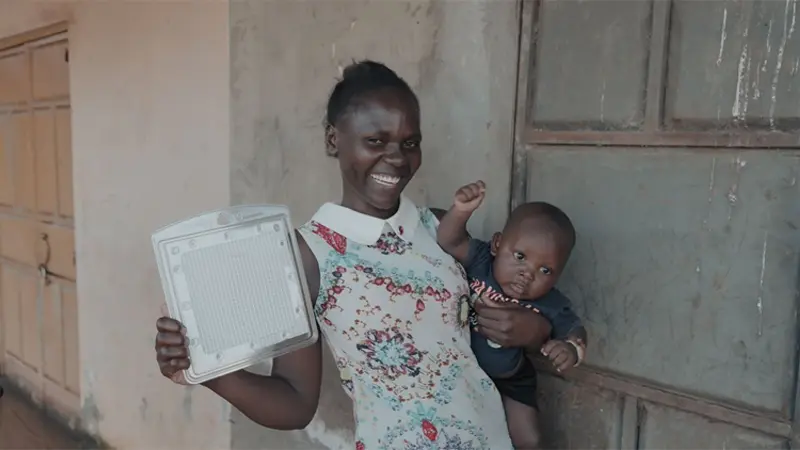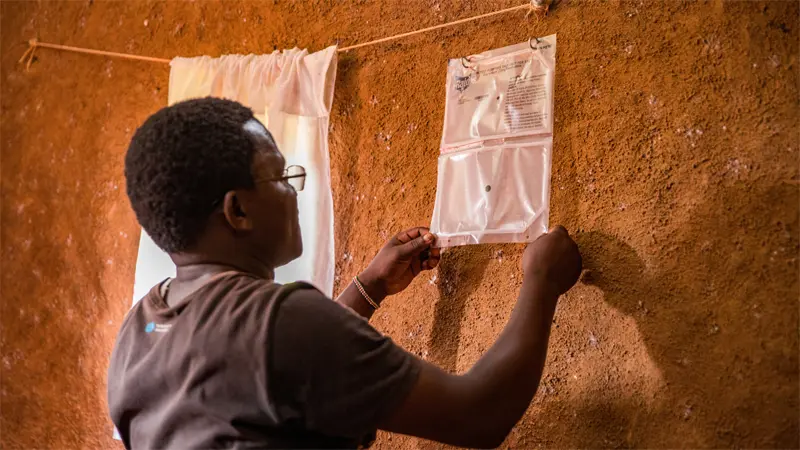Our Mission to Help End Malaria
Malaria is one of the world’s deadliest diseases. Even in 2026, it takes the life of a child under 5 every minute – a statistic SC Johnson and our dedicated partners are working to change.

By leveraging our decades of entomological expertise and capabilities, we have developed breakthrough spatial repellent tools like Guardian™, that can significantly reduce the presence of mosquitos in households.
Why it matters
people die from malaria every year
are the most vulnerable to being infected with malaria
As the makers of Raid®, OFF!® and Baygon®, and a leader in the insect repellent space, SC Johnson is committed to working toward the prevention and eradication of malaria.
For 70 years, we've used our entomological expertise to develop products that provide protection against malaria and other insect-borne diseases. Since 2013, our Healthier World Initiative has focused specifically on helping the world’s most vulnerable people fight against insect-borne diseases and other health concerns.
This includes committing over $100 million to the development, testing, production and deployment of spatial repellents as a new public health intervention to prevent insect-borne disease.
Even after 140 years, doing what’s right never gets old. Helping eradicate malaria is one way SC Johnson remains a family company at work for a better world.


New innovations to help.
SC Johnson has developed spatial repellents as a new public health intervention to prevent insect-borne disease. Their key benefits: effective, long-lasting, easy to use and easy to transport.

Mosquito Shield™ spatial repellent
An easy-to-use spatial repellent that can help protect a semi-enclosed or enclosed space from mosquitoes without requiring electricity or a flame to work.

SC Johnson Guardian™ spatial repellent
A spatial repellent that lasts for up to one year once opened made from 3D mesh fabric sealed in a PET cage that is hermetically sealed in a pouch and stable over time at elevated temperatures and humidity.
Insects, also known as vectors, spread diseases to humans. The World Health Organization currently recommends two primary interventions in the vector-control space: mosquito nets and indoor residual spraying. Spatial repellents could be a powerful third tool in the fight against insect-borne disease.
To secure a WHO recommendation, two studies showing positive impact on malaria incidence are needed.
In 2023, promising interim results from one study in Kenya were presented to the WHO’s Vector Control Advisory Group (VCAG). Ultimately, VCAG confirmed that the study results demonstrate the protective efficacy of spatial repellents.
Through 2026, a team led by Unitaid will conduct the remaining epidemiological and operational research required by WHO. The team has used our SC Johnson Mosquito Shield™ in large-scale, randomized, controlled trials in Mali and Sri Lanka.
On August 13, 2025, the World Health Organization (WHO) announced a policy recommendation for spatial repellents to be used as an innovative tool to help fight insect-borne diseases such as malaria, dengue, Zika and leishmaniasis. This recommendation strengthens confidence in Guardian and Mosquito Shield, further enabling SC Johnson to deploy these insect-borne disease prevention tools to the world’s most vulnerable communities at a much larger scale. The distribution comes at no profit to the company. Read more about the policy recommendation.

Steps toward a WHO recommendation
Here’s a look our actions that have spanned more than 15 years and countries around the globe, as we work to prove the impact of spatial repellents as an effective intervention.
2006 – Present
 |
China 2007 – 2009 |
 |
Indonesia 2010 – 2011 |
 |
Global 2013 |
 |
Indonesia 2016 – 2019 |
 |
Peru 2016 – 2019 |
 |
Kenya 2021 – 2023 |
 |
Mali 2022 – 2024 |
 |
Sri Lanka 2023 – 2024 |
 |
Global ongoing |






